Rules of LUCIFER: Does a Sociopath Go To Heaven?
How the rules of Heaven and Hell work in the Netflix series, "Lucifer"

With the recent release of Lucifer 5B on Netflix, the show is now Netflix’s #1 Most-Watched Show in 79 countries.
Fans are turning to forums and social media with theories, excitement, questions...
There’s one particular question, coming up again and again, that stands out to me:
"If heaven and hell are based on one’s own personal guilt, would that mean a sociopath (someone who feels no guilt) would go to heaven?”
(Let me just set aside the fact that I literally wrote and directed a short film with this VERY CONCEPT ten years ago...)
*Okay, fact set aside. Wonderful.
So… Does a sociopath go to heaven?
The show does, in fact, answer this question. But how many viewers have caught it? And how many of our own preconceptions might get in the way of catching it?
Would it be so bad if sociopaths did go to heaven?
(I’d expect to hear a resounding, “YES!” from y’all….)
But why?
Within the rules of Lucifer, we’ve established that a person’s own guilt will trap them in hell, so why wouldn’t a lack of guilt take them to heaven?
And why would it anger us all so much if it did?
Maybe because we’re not sociopaths and we want justice in this world…?
Well, it certainly seemed like Cain would go to heaven, merely for lacking any guilt for what he had done. He said as much as he was dying.
Okay, Cain, you killed HOW many people? And ordered a gunfire blitz on the woman you supposedly just realized you “genuinely” love?!? With no remorse?!? WTF?!?
Thank God/Luci that Lucifer got back in touch with his devil self, just in time to remind Cain of his guilt for accidentally killing Charlotte… right?

Wait, though, do we actually know that Cain would’ve gone to heaven if Lucifer hadn’t interfered? I don’t see how we could know that…
Maybe Cain is not a great example then.
Okay, well, what about Eve? She was in heaven before she came back. Isn’t she responsible for casting all of mankind out of paradise? Wasn’t she the original sinner? Why the heck was SHE in heaven?
While I think the answer to this question does offer some important insight, she’s definitely not a sociopath. So, let’s hold on talking about her for a moment and get to the meat of why you clicked on this article.
What about the sociopaths?
Most people see sociopaths as cold, unfeeling, and incapable of guilt.
I can already hear some of you thinking, “Yeah, that’s exactly what they are, I know, I’ve interviewed 77 of them.”
Okay, Mom.
… Oh yeah, fun fact about me: I am the daughter of a Forensic Psychopathologist who studied, interviewed, and profiled serial killers. I also have a Bachelor’s in Psychology from Northwestern University. These facts may come in handy as I share my insight!
The best way to proceed in answering this question would be to first establish some key moments from the newly released 5B that give us a more solid foundation for understanding the rules of Heaven and Hell, and then some real-world definitions (yup, from real-life).
KEY MOMENTS FROM 5B —
1) Michael scares Lucifer with the rules, which now put Chloe in danger (Season 5, Episode 16).
Michael: Chloe will be down there with you. I mean, talk about happily ever after.
Lucifer: What are you talking about? That’s impossible! Even if you become God, you wouldn’t have the power to force her soul down there. Only someone’s guilt can take them to hell.
Michael: Exactly! Think about it. The father of her child is dead because of a case he was working for her.
2) Lucifer warns Chloe of the rules and she offers a very insightful response — an important reminder that the feelings that drive us towards self-actualization are unconscious (Season 5, Episode 16).
Lucifer: Michael killed Dan so that you would feel guilty, so that when you die, you’ll go down to hell. A twisted bribe to get me to go back like a good little Devil.
Chloe: I don’t even know … I don’t know what to do with that!
Lucifer: You must refuse to give in! It’s all a manipulation… Detective, you mustn’t feel guilty!
Chloe: Right, yeah, okay. I’ll just snap my fingers and not feel guilty.
Lucifer: I’m serious, Detective!
Chloe: I’m serious too — that is not how emotions work, Lucifer! Prove me wrong! Go ahead, go on! Just … feel worthy! Oh, you know what? No, this is better. This is better: Make yourself vulnerable.
(She stabs him; it does nothing.)
Chloe: It’s easier said than done, isn’t it?
3) Linda gives Trixie some wonderful advice (Season 5, Episode 11).
Trixie: So, if I DID have denial, how would I cure it?
Linda: Well, if I were you, I might try to be my own detective. I’d look deep down inside my heart to find out who I was really mad at. And then I’d tell that person how I was feeling.
Trixie: Even if it might hurt them?
Linda: Even if it might hurt them.
Linda reminds us all that it takes work to actually understand ourselves. Much like Chloe said, it isn’t so easy. This is why, of course, therapy is so important.
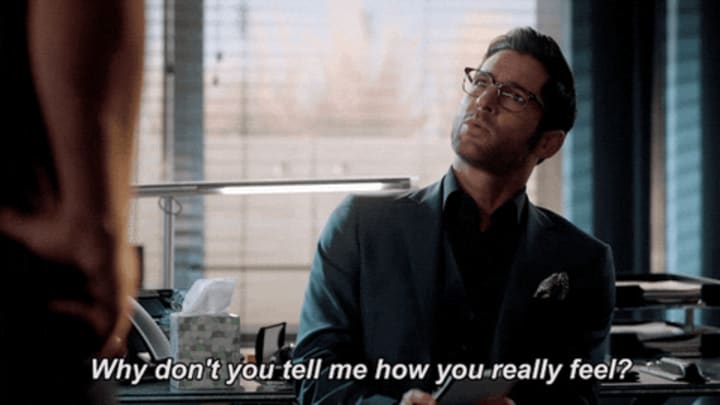
FOR REAL-WORLD DEFINITIONS, LET’S —
- Define a “sociopath.”
- Define “guilt.”
- Define “pure evil” and whether or not we can prove it exists.
DEFINE A “SOCIOPATH”
A sociopath is defined as someone who has antisocial personality disorder.
The DSM-IV-TR defines antisocial personality disorder as:
A. There is a pervasive pattern of disregard for and violation of the rights of others occurring since age 15 years, as indicated by three (or more) of the following:
-1. failure to conform to social norms with respect to lawful behaviors as indicated by repeatedly performing acts that are grounds for arrest
-2. deceitfulness, as indicated by repeated lying, use of aliases, or conning others for personal profit or pleasure
-3. impulsivity or failure to plan ahead
-4. irritability and aggressiveness, as indicated by repeated physical fights or assaults
-5. reckless disregard for safety of self or others
-6. consistent irresponsibility, as indicated by repeated failure to sustain consistent work behavior or honor financial obligations
-7. lack of remorse, as indicated by being indifferent to or rationalizing having hurt, mistreated, or stolen from another.
B. The individual is at least age 18 years.
C. There is evidence of conduct disorder with onset before age 15 years.
D. The occurrence of antisocial behavior is not exclusively during the course of schizophrenia or a manic episode.
Quoting the DSM … in a Lucifer article …
Well, you’re welcome.
First off, the DSM is a book of pathologies that has been edited 7 times. It evolves as we grow to understand ourselves and each other better, which we are all still very much doing.
Now, that disclaimer aside, we can all see that sociopathy is a personality disorder! Man, a personality disorder sounds so permanent, doesn’t it?
Ugh, personality disorders were my least favorite discipline to study while earning my Bachelor’s. Because how mean to tell someone their personality is wrong! What can a person even do about that?
But I know now there’s more to them than meets the eye, which I will get into later.
DEFINE “GUILT”
Oxford Languages defines guilt as:
the fact of having committed a specified or implied offense or crime.
Interesting… there’s really no emotional component in that definition.
But if we compare the concept of guilt to how the DSM defines a sociopath, we’d probably latch onto this section from the DSM-IV-TR:
-7. lack of remorse, as indicated by being indifferent to or rationalizing having hurt, mistreated, or stolen from another.
The word “guilt” is never used, but “remorse” and “guilt” certainly seem similar enough, don’t they?
Differencebetween.net has this to say:
Guilt is acknowledging a crime or a harmful action while remorse is regretting the actions and taking steps to undo damage. 2. Guilt tends to lead to destructive tendencies while remorse leads to constructive actions.
So what would it mean to deduce that sociopaths lack remorse but actually do have guilt?
Well, don’t sociopaths hide their actions? They’ll rationalize that they hide their actions only to avoid the consequences of such actions, but recognizing and acknowledging that society doesn’t approve requires a level of awareness that it’s wrong.
What they lack is the empathy or compassion to care what society thinks, to have remorse, and take constructive actions. So they might know and understand that an action is wrong, but they can’t get themselves to feel it or care.
Thus, it would be reasonable to say that sociopaths have guilt, even if they don’t “feel” guilt.
Guilt is destructive. The choice to do something deemed wrong by society is not only destructive to society but destructive to oneself as well.
There are concrete side effects to destructive actions (jail, loss of social status, etc.) and the choice to proceed with them anyways provides a direct violation against what is constructive and best for oneself and those around them.
No matter what one believes. Or feels.
Remember when Eve asked Mazikeen to help convince Father Kinley to help her? (Season 4, Episode 9)
Eve: Hey, you think you can maybe work your magic on the Priest? You know, convince him that he’s wrong about the prophecy using your knives and… other sharp objects?
Maze: I’ve tortured guys like Kinley before. He’s a fanatic. Nothing I do will change his mind.
Yet, we know he still went to hell.
The concrete and destructive effects of his obsessiveness included actually setting into motion the very prophecy he spent his whole life’s work trying to prevent!
Very destructive. Even the Church agreed to testify against him.
Professor Carlisle believed his actions were a means to an end, yet his hell loop was his destructive choice to save his laptop, again and again, followed by severe judgment from onlookers – It was because of the judgment that he broke down and felt tortured. His psyche was processing his guilt, by very literally showing him the destructive social impact of his actions.
But what about when wrongdoers are in power? Historically, we’ve seen examples of sociopaths that rose to the level of power where they could determine what society felt was wrong or right… Do they still acknowledge any guilt?
Even in these instances, there are still very real, concrete, destructive effects. Changes in policy that hurt others will do so regardless of what a society of “supporters” feels about those changes.
The destructive impact is present, even if not consciously felt.
Though, this may lead some of us to a new question… What about a soul that is just pure evil?
DEFINE “PURE EVIL” AND WHETHER OR NOT WE CAN PROVE IT EXISTS
“Pure evil” would likely refer to some essence of evil that is purely destructive and absolutely unredeemable. Does such an essence actually exist?
This is probably a very personal question to answer. Readers will likely have different viewpoints, depending on their religious background or whether or not their mother raised them on such graphic details as to how John Wayne Gacy stored little boys in his fridge for future meals, or how Lawrence Bittaker bludgeoned young women to death... oh and I was 5 years old...
If I can grow up with THAT voice in my ear and still think that true evil might not exist ... Then there’s hope for all of us to see the world that way…
Regardless, this topic is hard to address within real-world rules, because … who can actually say? What can we prove? Is there even any point in trying to prove the answer one way or the other?
Pure evil just isn’t falsifiable.
So let’s cross from the real-world, real-life rules into the fictional rules of Lucifer.
“Our show is about redemption. If the devil can be redeemed, so can us all.”
- Joe Henderson, LUCIFER Co-Showrunner
Within the framework and spirit of the show, there’s one clear answer to the question of whether pure evil exists, because:
Even the Devil can be redeemed.
And a demon can grow a soul!

So, within the rules of the show, if we accept that even the Devil can get a redemption arc, how can we purport that pure evil exists?
We can’t.
By that logic, redemption must be possible for everyone.
Yes, everyone.
Even sociopaths…
WHOA WHOA WHOA, SO NOW YOU’RE SAYING SOCIOPATHS *COULD* GO TO HEAVEN?
Well, not in their current form, no. Not as a sociopath.
But look, if everyone has the capacity for redemption, then arguably, everyone would have the capacity to go to heaven.
Imagine with me, for a moment, a double-pan balance, the very scale that’s used as the symbol for justice.

Every choice we make in our lives would have a different weight on the scale, specifically on a different side of the scale.
Rather than use the terms “good” versus “bad,” I would like to adopt the terms “constructive” versus “destructive.”
For the sake of the point of this article, let’s analyze how a sociopath might relate to such a scale within this metaphor.
Sociopaths are selfish, manipulative, and deceitful.
Every action in line with those qualities would likely belong on the destructive side of the scale. If they make these actions regularly, the destructive side of the scale would be very heavy, if not nearly dislodged.
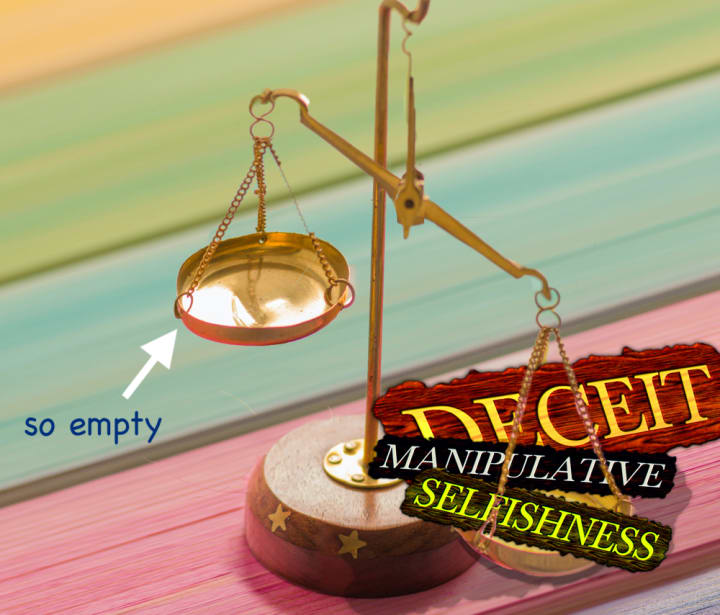
The other side of the scale would be empty — no actions based from care, compassion, or love.
Even if conscious awareness (feelings, conscience) was limited to where the weight was, the scale itself would still indicate the balance or lack thereof (purely because it has the capacity to measure either extreme).
So maybe we can now more easily envision a deeper acknowledgment of an empty side of the scale, dangling there…
The capacity, alone, creates the measurement of factual guilt.
The more extreme the weight, the harder it would seem to ever balance out the two scales, much less tip the weight to the other side.
It would be incredibly difficult for a sociopath to ever change their ways, but “incredibly difficult” does not mean impossible.
BUT IF IT’S THEIR PERSONALITY…
Yes, the DSM-IV-TR does call it a personality disorder, doesn’t it?
It’s their “personality” that’s the problem…
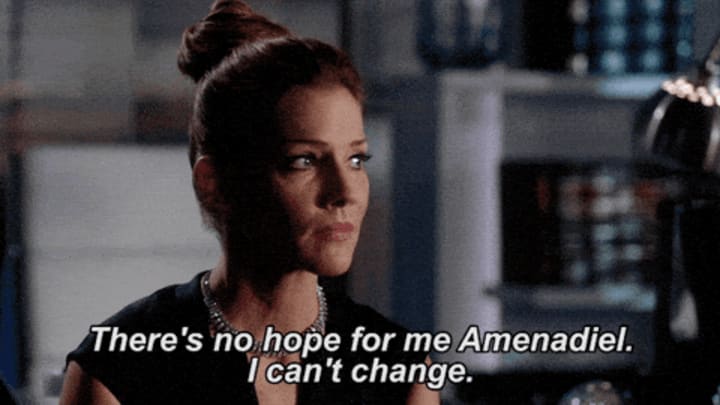
Dr. Joe Dispenza’s book, “Breaking The Habit of Being Yourself,” discusses how every time we choose to dwell on a certain emotion or live in it, we start to memorize it and become used to it. Said emotion evolves into a mood, which evolves into a temperament, which eventually becomes a personality trait.
So, our personality is really just our current collection of habits formed from the choices we've learned to make (choices like how to think, feel, and behave).
Has a long-time friend ever told you, “You’ve changed” after an extended absence? Has a shocking life event ever changed the way you or someone you love sees the world?
Personalities do change.

Every day, we choose who we are and who we will become.
BEING OPEN TO REDEMPTION
A world where redemption is always possible is a world where we can constantly grow and evolve.
That’s why, despite my mom’s assertion that looking into the eyes of a serial killer would convince me that pure evil does exist, I’m sorry, I don’t accept it.
I think if we at least open ourselves to the possibility of redemption, no matter what the crime, we open ourselves to so much more. Like this Neo-Nazi who eventually chose a different path for himself.
Christian Picciolini is a man that contributed to a lot of destruction in his youth, but through compassion and care, pulled himself out and changed his mission in life. Now, he works to convert other hate-filled people and his actions have major constructive effects.
As he said in the above video, the most important step to redemption for those filled with such hate was “receiving compassion from the people they least deserved it from, when they least deserved it.”
If we say: evil is and always will be unredeemable evil... Then, at its simplest: it always will be.
If one is always going to be judged as evil no matter what, it only makes sense to double down and commit. Why waste energy on hopeless endeavors?
Isn’t that what Lucifer deals with in Season 4 when he contemplates returning to his old devilish ways under the influence of Eve’s restless boredom and Chloe’s honest fear?

If we, instead, choose to believe that redemption is always possible...
Well…
I mean, there’ll definitely still be evil, don’t get me wrong!
"Evil" people might never redeem themselves.
But also, they might.

And if they don’t even want to try, they can rot in hell by their own choice. C’est la vie.
SO…
So, everyone is redeemable. It took Lucifer millennia to get his redemption arc, though, so no one is saying it’s easy. Not even a little. It takes major effort and major work.
Sociopaths are just souls that are far more disconnected from their ‘inner capacity for constructive good’ than the average person. That doesn’t mean that inner capacity isn’t there.
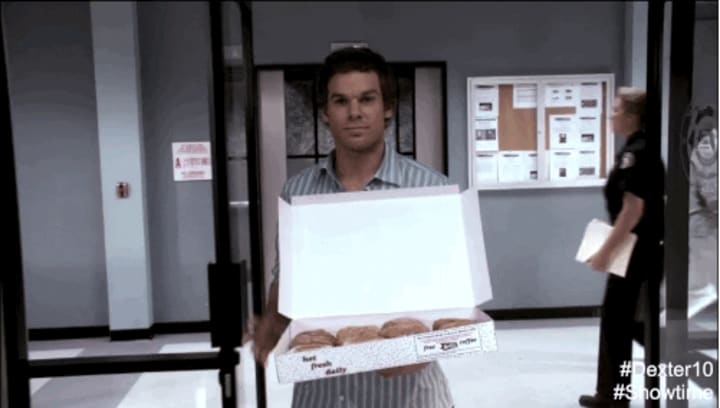
They might not consciously feel guilt, but they do rationalize their hurtful actions.
The very need to rationalize something indicates having something to rationalize, ie., a deeper knowing that the action is wrong.
Father Kinley’s true guilt went deeper than his conscious awareness. He rationalized his wrongdoing as God’s work.

Yet, since we know he went to hell, we also know that somewhere deep inside was the certainty that he had done wrong, even if he didn’t emotionally connect with or “feel” that truth.
So, a sociopath, by definition, who has acted destructively, would in fact go to hell.

For sure, Pete will rot in hell.
But a sociopath is also capable of redemption. Like all of us. (Though, the worst of them will definitely need at least a few millennia to get there.)
That is why Lucifer spares Michael’s life at the end of 5B. Because the whole moral/message of the show is: Anyone can be redeemed.
That may unsettle those who do believe in pure evil, but leaving hope for the damned souls gives hope to everyone else… Why?
Because what about Michael’s threat that Chloe’s guilt would take her to hell?
CAN *GOOD* PEOPLE REALLY GET TRAPPED IN HELL?
If a sociopath would, in fact, go to hell, mainly because of destructive consequences, despite whatever they feel, surely, that means a good person would never be driven down there just because they do feel guilt, right? Right???
Take Dan. Poor Dan…
Dan was really trying to be a good person, wasn’t he?
Shouldn’t that count for something?
Although, “trying” certainly implies he didn’t feel like he was a good person at all. Hence the need to try. Isn’t that consistent with his worries about Trixie in (Season 5, Episode 11) with “how easy it is to get on the wrong track”?
“Whether or not he did something that warranted putting himself there, he felt he DESERVED to be there.”
- [About Dan going to hell], Ildy Modrovich, LUCIFER Co-Showrunner
But feeling he’s a bad person shouldn’t matter… why are the feelings irrelevant for the sociopath but not for the regular person who feels?
...HE HAD GOOD INTENTIONS!
Surely, good intentions would have very different effects on the world than deliberately manipulative and selfish intentions… right?

We learned in Season 5, Episode 12 (Daniel Espinoza: Naked and Afraid) that Lucifer could easily predict every single decision Dan would make because he knew that Dan, “when given the choice, would always at least try to do the right thing.”
But didn’t we also see exactly how “trying to do the right thing” ended up getting everyone killed?
Granted, that was all within a perfectly orchestrated prank… A prank that literally utilized “Easter eggs from their previous adventures.”
As viewers, we got to see a very literal example of Dan’s "past" culminating and catching up to him (his shady ex-partner, his history with the Russians, Los X, just to name a few). His "past self" started a bunch of fires for his "present self," fires he had to work very hard to extinguish. Or try to extinguish.

Lucifer may have fanned the flames, but everything came from Dan's past, so Dan started the fire.
Dr. Joe Dispenza’s book, “Breaking The Habit of Being Yourself,” (previously mentioned) actually refers to the disconnect between the past and present self throughout his book, because:
“To change our personalities, we have to change the emotions that we memorize. We have to move out of the past.”
— Dr. Joe Dispenza
As long as there exists a discord between oneself and a past version of oneself, there also exists some “darkness” that has yet to be faced — some deep underlying issue. And as long as that issue remains deep and underlying and unconscious, it will continue to influence one’s present, tipping the scales against the “constructive good” one might keep trying to accomplish.
Once we break the emotional addictions rooted in our past, there will no longer be any pull to cause us to return to the same automatic programs of the old self.”
— Dr. Joe Dispenza
But until we do face our underlying issues, the message is again, very clear:
If you don’t face the underlying issue now, you will be forced to face it over and over and over and over and over again in hell.
If that seems unfair, let’s remember Linda’s wise words.
“Well, if I were you, I might try to be my own detective. I’d look deep down inside my heart to find out who I was really mad at.”

HEAVEN AND HELL AS METAPHORICAL INSTEAD OF LITERAL
For people of faith who view heaven and hell as very literal, just suspend disbelief with me for a moment…
Good people are trapped in metaphorical hell loops every day!
I think that’s what makes the series so profound… because anyone who’s ever hated themselves or dealt with addiction can probably attest to feeling “aware” of doing something “wrong,” yet “unable” to take a different course of action.
As if stuck in a hell loop right here on Earth!
Every day, in real life, we find ourselves in patterns of action we trap ourselves in, under the guise that we don’t have a choice otherwise. We let habits that we built up in our past control our present.
Like Dan, we might think, "It’s too easy for me to get on the wrong track, so I must be bad," and therefore our core view of ourselves keeps us in the corresponding pattern of action.
Leading to: destruction.
What’s more self-destructive than delivering a package to the Russian mob like it’s the "right thing to do" for his “reformed” but-still-shady-AF ex-partner?
Whether destructive to the self, to loved ones, or to complete strangers, still: destruction.
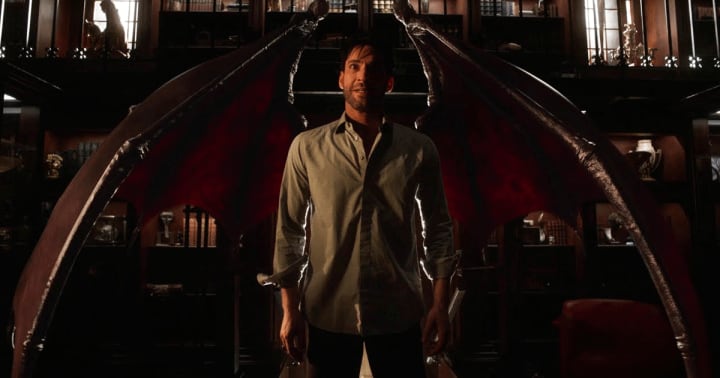
As long as there’s discord and disconnect between one’s present self and one’s past self, destruction will always follow.
That is precisely why God tells Ella (Season 5, Episode 14):
“Everyone has darkness in them. It’s not about getting rid of it, it’s about accepting it.
The darker the darkness, the brighter the light.”
Season 4 remains my personal favorite season because once Lucifer accepts his darkness, he also uses it for constructive good (getting the demons to leave Earth).
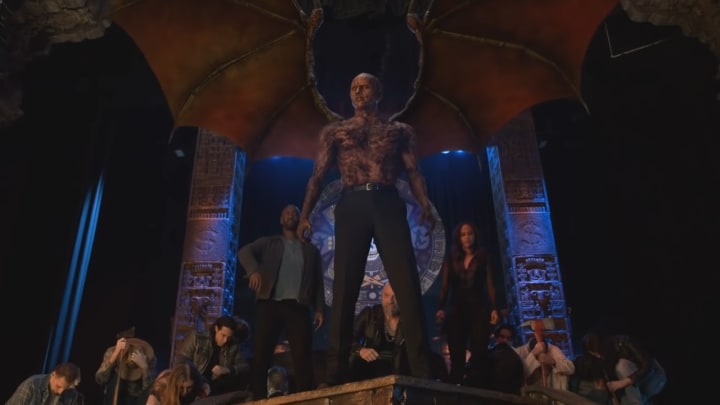
The next time we see his wings, they’re angelic again.

YES, A GOOD PERSON CAN BE TRAPPED IN HELL
If we can create our own metaphorical hell on Earth, why wouldn't we be able to create one ... elsewhere?
Hell is just a projection of our own inner psyche (of which we seldom have conscious awareness, especially if we’re just torturing ourselves).
If Chloe’s guilt over Dan’s death had led her to lash out at her daughter, for example, we’d have a perfect example of a destructive effect, caused by her guilt, in the real world. Such an example helps demonstrate how she could very reasonably trap herself in hell.
But she didn’t lash out at her daughter; she didn’t use her “guilt” destructively. She used her emotions constructively.
We always have a choice on how we take whatever comes our way. Just as she demonstrated.
She actually sacrificed herself for a cause she believed in when she brought her vulnerable human self into a war against invulnerable immortal angels.
THE THEME OF SELF-SACRIFICE AS THE MOST POWERFUL REDEMPTION
We just discussed Chloe’s own example, but how many other examples are there in the series?
How about Charlotte?
Charlotte got her second chance at life after witnessing her own hell loop — that’s kind of like entering a cheat code in a video game to see underneath the hood.
She’s a great example of someone who’s never technically committed a major crime. She never actually hurt anyone. All she did was help horrible people get away with horrible crimes — but this was also her biggest source of guilt.
Before her first death, she never settled this discontent within herself, she just took the money instead.
But with her second chance at life, she did the work to bring that issue to the surface and face it head-on.

She faced difficulty and the uncertainty that she would ever find inner peace or reach heaven.
And then, she sacrificed herself to save Amenadiel.
Putting someone before oneself is the ultimate act of compassion, empathy, and care. It’s basically the biggest weight one can possibly put into the other side of the scale.
The ultimate way to break a destructive pattern.
We saw it work for Charlotte at the end of Season 3.
And then we saw it work for Lucifer at the end of 5B. The ultimate self-sacrifice broke his patterns of seeing himself as unworthy of heaven and being God.
Self-sacrifice exists on one extreme, while a serial killer’s actions exist on the literal opposite extreme.
By the DSM-IV-TR definition, a sociopath could not take such a selfless action. Or at least, if they ever did, we would have to rethink having ever called them a sociopath, to begin with.
SO… CAIN THEN…
Based on the reasons outlined above, Cain would’ve gone to hell regardless of what Lucifer did in his dying moments. It was still scary there for a moment, though, when he said his conscience was clear... Then oh so satisfying when Lucifer made all too certain it wasn’t.
As satisfying as it felt, it might also be a great iteration of the famous quote:
“Before you embark on a journey of revenge, dig two graves."
Confucius (504 BC)
Cain had crossed some serious lines and no one will fault Lucifer for killing him in both self-defense and defense of Chloe, but his resurfacing of his Devil face shows that he tapped into a place of great shame (the same place he would spend all of Season 4 trying to get back from).
Even if we hear a sociopath say, “Yeah, no, I feel no guilt,” that only illuminates their conscious awareness of themselves.
And characters always have perfect conscious accuracy about what’s going on for them, right? Kind of like when poor Luci thought he was incapable of love?
Yeah, right, he loves Chloe more than life itself!

Our conscious awareness of our innermost selves is not inherent, not even adequate without a lot of personal detective work.
…AND EVE?
Eve was the first woman. Not coincidentally, her entire existence seemed to be in service to a man.
Much like another woman...
So why did Eve go to heaven despite her original sin and relationship with temptation? I suspect there’s a lot we still don’t know about her full story.
Maybe those transgressions actually had no destructive effect on Adam at all, like maybe Adam didn’t even care…
Regardless of what we don’t know about her story, we do know that she exhibited care and compassion when she protected Trixie from that gunman after Lucifer (Season 4, Episode 7). She even put herself in front of Trixie to protect her (even though she’s very mortal and very vulnerable).
Perhaps her care and compassion made her deserving of heaven, even if her own unresolved issue of finding her self-worth led to utter restlessness and boredom with heaven.
She’s a reminder to us all that it’s never too late to start digging into our issues and being our own Detective. She’s literally the oldest human woman alive, she’s had millennia in heaven to think it over, and she’s still working on herself.
As are all of us.
We choose every day who we are going to be.
My mom did many seminars on understanding the serial killer and a question she’d get a lot was: "Most of them were abused as children, right? Is that maybe why they do what they do?”
And she’d always say, “Maybe. But you know who else was abused as a child? Stephen King. He channeled that trauma into stories instead."
Whatever happens to us is out of our control. But how we handle it is very much up to us.
We can all turn any scenario into its own heaven or its own hell.
So which do we choose?

Thank you for reading. If you enjoyed this article, please share the link, like it, or leave a tip!
Be sure to reach out and connect with me on Facebook, Instagram, and Twitter too.
You, too, can share your input on something you care about by signing up for Vocal here.
Oh and...
*I just couldn’t set it aside for long... the logline for this short film from ten years ago is LITERALLY: “A serial killer goes to heaven."
How do I NOT share it here when it’s SO dang relevant?
About the Creator
Casara Clark
I was a dark chocolate enthusiast before it was cool.






Comments
There are no comments for this story
Be the first to respond and start the conversation.